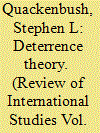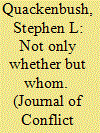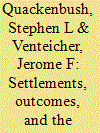|
|
|
Sort Order |
|
|
|
Items / Page
|
|
|
|
|
|
|
| Srl | Item |
| 1 |
ID:
102437


|
|
|
|
|
| Publication |
2011.
|
| Summary/Abstract |
Although deterrence theory was a central focus in the study of International Relations during the Cold War, attention has shifted away from deterrence since the end of that conflict. Nonetheless, deterrence is a general phenomenon that is not limited to any particular time or space. Moving beyond a simple focus on the US-Soviet relationship, scholars have recently begun further explorations of deterrence, through development of theory, analysis of policy alternatives, and empirical analysis. This article seeks to evaluate where deterrence theory stands today through: (1) a consideration of distinctions between different strands of theory; (2) a discussion of the assumption of rationality in deterrence theory; (3) an examination of three important distinctions in deterrence; (4) an evaluation of the difficult task of testing deterrence theory, and (5) an overview of recent theoretical developments. The primary conclusion is that perfect deterrence theory provides a logically consistent alternative to classical deterrence theory and therefore provides the most appropriate basis for further theoretical development, empirical testing, and application to policy.
|
|
|
|
|
|
|
|
|
|
|
|
|
|
|
|
| 2 |
ID:
109912


|
|
|
|
|
| Publication |
2011.
|
| Summary/Abstract |
Previous research, applying perfect deterrence theory, has demonstrated that national missile defense generally enhances the stability of deterrence, primarily because it makes the defender's retaliatory threat more credible. However, stability is not ensured, because missile defense has the potential to increase other states' dissatisfaction with the status quo. Consequently, dissatisfied states have an increased incentive to challenge the status quo, undermining deterrence stability. Although there is a lengthy literature debating this point, no one has conducted a rigorous empirical analysis of the impact of national missile defense on satisfaction. To address this significant gap in the literature, we analyze the impact of US missile defense programs on other states' status quo evaluations through analyses of events data, 1985-2004, and UN voting data, 1985-2008.
|
|
|
|
|
|
|
|
|
|
|
|
|
|
|
|
| 3 |
ID:
072555


|
|
|
|
|
| Publication |
2006.
|
| Summary/Abstract |
Although in reality, states simultaneously pursue direct and extended deterrence, extant theories of deterrence have considered direct and extended deterrence situations separately. Furthermore, extended deterrence theories have not modeled all three actors in extended deterrence situations. To overcome these limitations in the literature, the author develops the three-party extended deterrence game and analyzes it with both complete and incomplete information, allowing conclusions to be drawn regarding deterrence and the related areas of alliance reliability and war expansion. For example, the findings indicate that deterrence is most likely to succeed when the alliance between Defender and Protégé is reliable. However, neither Defender nor Protégé wishes to be a more reliable ally than the other; if there is an asymmetry in reliability, Challenger will chose the more reliable state to attack in order to avoid a multilateral war. This counterintuitive conclusion was only reached by considering all three actors in extended deterrence.
|
|
|
|
|
|
|
|
|
|
|
|
|
|
|
|
| 4 |
ID:
084990


|
|
|
|
|
| Publication |
2008.
|
| Summary/Abstract |
Despite the hope that the resolution of one militarized dispute will bring peace to a dyad, these conflicts often recur. This recurrence of conflict is particularly important because subsequent disputes within a dyad tend to be more severe than previous ones. However, the factors leading to recurrent conflict remain a matter of debate. While some argue that the settlement of a dispute has a significant impact on post-conflict relations, others argue that the outcome of a dispute is the most important determinant of post-conflict stability. Although evidence has been found to support both views, the relative impact of dispute settlements and outcomes has not been satisfactorily determined. Accordingly, this article simultaneously examines the relationship between settlements, outcomes, and conflict recurrence through survival analyses of the periods of peace following 2,973 dyadic militarized interstate disputes between 1816 and 2001. The authors find that although settlement type is an important predictor of recurrent conflict, with imposed settlements being the most stable, outcome type has no significant effects on post-dispute peace duration. The article concludes with a preliminary analysis of the factors that lead to the varying forms of settlement.
|
|
|
|
|
|
|
|
|
|
|
|
|
|
|
|
|
|
|
|
|